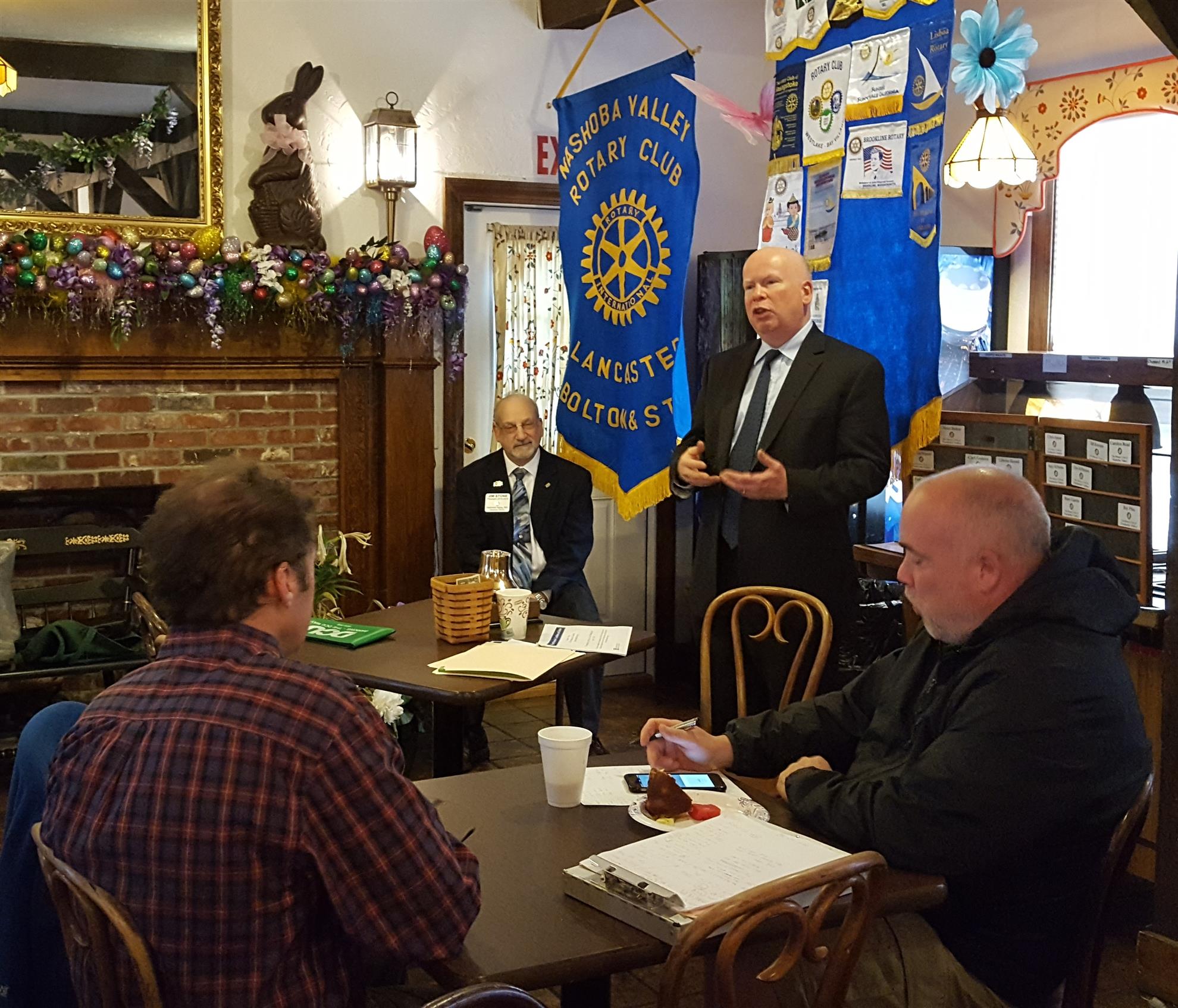Weekly Bulletin - April 7th Meeting
Posted by Richard Garcia
on Apr 14, 2016

Robert Triest, vice president and economist in the research department at the Federal Reserve Bank of Boston, spoke about economic conditions in New England.
Guests:
- Robert Triest, Speaker
Announcements:
- A reminder about the District Conference, and a call for volunteers to serve with the Acton-Boxborough club in the hospitality suite.
- April 11, Red Sox home opener and cookout, for the Stow Council on Aging.
- April 15, the reality fair at Nashoba Regional High School; volunteers are urgently needed. Also, setup is Thursday afternoon. No regular meeting next week.
- April 21, President Elect Chris will be speaking.
- Birthdays: President Jim
- Repair cafes: Stow April 16, Bolton in May.
- A walk for the Healing Garden on May 22; Brian and Jacky have formed a team.
Happy/sad fines:
- Brian: just happy.
- Chris: sad that he hit a guard rail on a slippery road Monday; and is glad to be looking for a new job.
- Carol: sad that she also had a car accident.
- Laura: happy about social media seminar, dueling pianos show
- Ray: back from his trip to Argentina, where he had a wonderful time; also happy that the repair café events are succeeding.
- Leigh: has discovered the Good Reads app, with lots of good reads.
- Mary Ann: happy about her wonderful trip to Ireland
- Bob: wants to give a bribe to Mother Nature.
- Bill: is glad that winter will be over soon.
- Robert: happy to be here; although he loves winter, his colleagues at work are sick of hearing about how wonderful the winter weather is.
Program:
Robert Triest, vice president and economist in the research department at the Federal Reserve Bank of Boston, spoke about economic conditions in New England. As part of the nation's central bank, the Federal Reserve Bank of Boston promotes sound growth and financial stability in New England and the nation. The Bank contributes to local communities, the region, and the nation through its high-quality research, regulatory oversight, and financial services, and through its commitment to leadership and innovation.
The Boston Federal Reserve is one of twelve offices, and is responsible for all of New England, except for Fairfield County, Connecticut. Fairfield County is home to many financial services companies, and also to many people who work in New York and are tied to Wall Street.
Economic data on New England is available on the web site, through the Leading Economic Data database. Conditions have been gradually improving since the end of the recession, with unemployment coming down since 2009. The forecast is that growth will continue.
If the recession ended in 2009, why are economic indicators so far behind? Recessions begin with a downturn in economic activity, and end with the upturn—the low point. It’s taken all these years for unemployment to decrease to levels comparable to before the recession, currently about 5%. Massachusetts has been outpacing the rest of the country in regaining the jobs lost, even though at the start of the recession we were still trying to get back from the previous recession (the dot-com bust).
Question: How is the high cost of housing affecting employment? Housing costs have gone up because employment is up, businesses are expanding, and people are seeking opportunities; also land use policies affect construction.
Question: Not all employment is the same; what if a software engineer retires, and is replaced by a fast-food worker? They do keep track of that through measuring employee utilization, the U6 rate. The U6 rate has also come down quite a bit, but not quite as quickly as the unemployment (U3) rate.
In the US, things are looking good. Outside the US, things are shakier. Europe is good, although there are still geopolitical factors, which makes it a problem area. China is also a problem area; it had growth rates that were the envy of the world, but have now started to slow down, even though still relatively high. Commodity prices have declined generally, also causing problems for some countries. We’re doing well, but on a planet that’s doing less well. So how long we can continue is an open question.
Question: Can you explain “negative interest rates”? Banks are required to have reserves, and so they will pay to attract large deposits so that they have more money to lend.
Question: How is South America doing? It’s also a problem area, especially in countries dependent on commodities. Even though South America has grown a lot, it’s still in competition with other parts of the world.
Question: How about sub-Saharan Africa? Even though it’s the poorest part of the world, it’s had some really rapid growth, despite the problems it’s had (AIDS epidemic, political turmoils, etc.). But sub-Saharan Africa doesn’t have the same impact on the world economy as other parts of the world.
